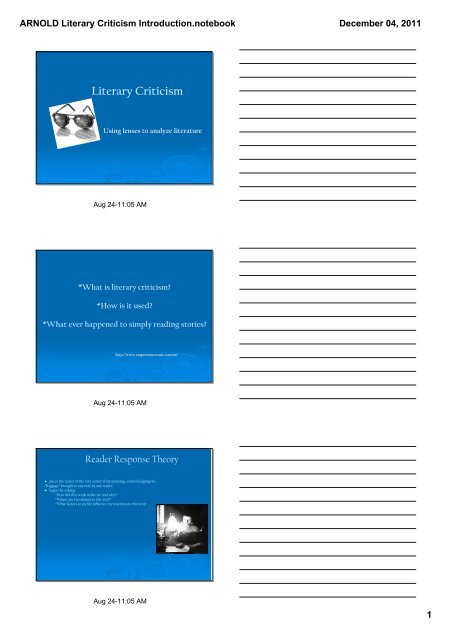Literary Criticism Power Point Handout.pdf - Ms. Arnold's Wiki
Literary Criticism Power Point Handout.pdf - Ms. Arnold's Wiki Literary Criticism Power Point Handout.pdf - Ms. Arnold's Wiki
ARNOLD Literary Criticism Introduction.notebook December 04, 2011 Literary Criticism Using lenses to analyze literature Aug 2411:05 AM *What is literary criticism? *How is it used? *What ever happened to simply reading stories? http://www.emperorsnewsuit.com/en/ Aug 2411:05 AM Reader Response Theory • places the reader at the very center of interpreting, acknowledging the “baggage” brought to any text by any reader. • begins by asking: “How did this work strike me and why?" “Where am I in relation to this text?” “What factors in my life influence my reactions to this text? Aug 2411:05 AM 1
- Page 2 and 3: ARNOLD Literary Criticism Introduct
- Page 4 and 5: ARNOLD Literary Criticism Introduct
ARNOLD <strong>Literary</strong> <strong>Criticism</strong> Introduction.notebook<br />
December 04, 2011<br />
<strong>Literary</strong> <strong>Criticism</strong><br />
Using lenses to analyze literature<br />
Aug 2411:05 AM<br />
*What is literary criticism?<br />
*How is it used?<br />
*What ever happened to simply reading stories?<br />
http://www.emperorsnewsuit.com/en/<br />
Aug 2411:05 AM<br />
Reader Response Theory<br />
• places the reader at the very center of interpreting, acknowledging the<br />
“baggage” brought to any text by any reader.<br />
• begins by asking:<br />
“How did this work strike me and why?"<br />
“Where am I in relation to this text?”<br />
“What factors in my life influence my reactions to this text?<br />
Aug 2411:05 AM<br />
1
ARNOLD <strong>Literary</strong> <strong>Criticism</strong> Introduction.notebook<br />
December 04, 2011<br />
Cultural Materialist/ Marxist Lens<br />
• concerns with the historical, political, economic, and social context.<br />
• questions the material world of the characters, especially the physical labor of<br />
such characters.<br />
• concerns with class issues and economic issues.<br />
Aug 2411:05 AM<br />
Psychoanalytic Theory<br />
• uses work of Freud and his successors, insisting that literary works are mirrors into<br />
an author’s psyche.<br />
• reflects central aspects of family origin and childhood.<br />
• stresses sexual development issues .<br />
Aug 2411:05 AM<br />
Jungian Theory<br />
• makes use of the work of Carl Jung<br />
• “archetypal symbols” reveal deep cultural messages across time and space.<br />
• universal “stories,” retold through the ages, evoking predictable responses.<br />
• for example, the hero’s journey<br />
Aug 2411:05 AM<br />
2
ARNOLD <strong>Literary</strong> <strong>Criticism</strong> Introduction.notebook<br />
December 04, 2011<br />
Feminist Theory<br />
• focuses on lives and works of women .<br />
• More recently, challenges the assumptions about language itself as well as<br />
revisiting canonical (traditional) texts.<br />
Aug 2411:05 AM<br />
Post Colonial Theory<br />
• acknowledges imperialistic nature of much of western culture, especially British and<br />
American.<br />
• attempts to expose the underside of 'white, male, Eurocentric' writing and scholarship.<br />
• attempts to show readers who was being expelled or shunned by those in power, what was<br />
being taken away from indigenous peoples in order to have "civilized" culture.<br />
Aug 2411:05 AM<br />
Modernist and Post Modernist Theory<br />
• relates to reactions among philosophers and artists to World War I.<br />
• stresses brokenness of human beings, inventing new techniques<br />
• post‐modernism associated with World War II<br />
• took the splintered views of modernism<br />
• stresses absences, contradictions, and inability of language<br />
Aug 2411:05 AM<br />
3
ARNOLD <strong>Literary</strong> <strong>Criticism</strong> Introduction.notebook<br />
December 04, 2011<br />
Deconstructionist Theory<br />
• centers around the belief contemporary society is a product of cultural construction.<br />
• literature should “deconstruct” back to its basis.<br />
• critiques everything found in the text, and questions the ability of language to show what an<br />
author might be trying to say.<br />
• novels are puzzles to be decoded.<br />
Aug 2411:05 AM<br />
Trauma Theory<br />
• focuses on violent actions that have occurred to characters and/or to their creators<br />
• central tenets include:<br />
trauma makes people withdraw and to seek close relationships simultaneously;<br />
victims act out of isolation OR a clinging to others;<br />
victims tend to have intense but unstable relationships with partners;<br />
witnesses caught between the victim and perpetrator<br />
• victims display:<br />
no sense of safety in the world around them;<br />
sense of violation;<br />
sense of being invaded, defiled, and out of control;<br />
doubt of self and others;<br />
a sense that any community or faith system has been damaged<br />
Aug 2411:05 AM<br />
Formalist/Structuralist Theory<br />
• Focuses on tone, plot, structure<br />
• concerns with who is telling the story .<br />
• asks how a story is packaged, i.e. is there a frame or is there just one narrative<br />
line throughout.<br />
Aug 2411:05 AM<br />
4
ARNOLD <strong>Literary</strong> <strong>Criticism</strong> Introduction.notebook<br />
December 04, 2011<br />
Cultural Continuance<br />
• particularly suited for application to Native American literature, African American<br />
literature or literature from any group systematically suppressed group<br />
• stereotypes freeze Native American culture in a romanticized past.<br />
• stresses the lives and cultural work of Native Americans living today, triumph<br />
over levels of repression<br />
• family, kinship, the land, and a deep capacity for survival figure largely<br />
Aug 2411:05 AM<br />
Ecocriticism<br />
• asserts nature exists apart from us<br />
• nature is not reducible to a concept and may be fatally altered by humans.<br />
• changes focus from the inner to the outer, so something like “setting” is brought from the<br />
margins to the critical center<br />
Aug 2411:05 AM<br />
5



